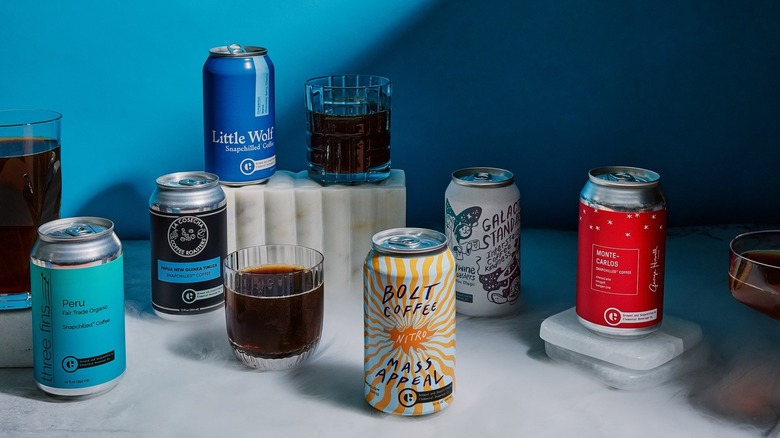Multiple Canned Coffee Brands Are Being Recalled Over Botulism Concerns
All products made by Green Bay, Wisconsin-based canned coffee company Snapchill LLC are under a nationwide recall after concerns were raised over possible botulism contamination. Currently, the truth about Snapchilled coffee is that you may want to think twice before popping open a can. Snapchill LLC announced the voluntary recall on June 17. A notice posted by the U.S. Food and Drug Administration (FDA) states Snapchill's "current [manufacturing] process could lead to the growth and production of the deadly toxin, botulinum toxin, in low acid canned foods." The announcement further indicates that no illnesses have been reported, and the company has no knowledge of any of their products containing the toxin.
Although rare, botulism is a potentially fatal illness that occurs when a bacteria called Clostridium botulinum produces botulinum — a deadly toxin the Centers for Disease Control and Prevention calls "one of the most lethal toxins known." Wreaking havoc on the nervous system, botulism can cause symptoms like muscle paralysis, difficulty breathing, trouble speaking, blurred vision, and drooping eyes. These typically appear 12 to 36 hours after consuming the toxic food and can be deadly if not treated swiftly.
Potentially contaminated coffee goes by many names
To make shelf-stable canned coffee, it goes through a heating process called retort that can make it taste a little weird. However, if this step is skipped, dangerous bacteria can grow. In this case, canned coffee drinkers shouldn't just steer clear of Snapchill's products but also any canned coffee made by the manufacturer and sold under a different brand name. The recalled product list contains more than 200 items that should either be destroyed or returned to Snapchill or the point of purchase for a refund. While the coffees may be sold under a variety of names, they will all have the words "Produced and distributed by Snapchill LLC" printed below the nutrition label.
The potential breach was caught when the FDA realized that Snapchill LLC never filed the specifics on their manufacturing process for low acid canned foods with the agency. Botulinum toxin is often produced in environments with low oxygen, low acid, low sugar, and low salt.

